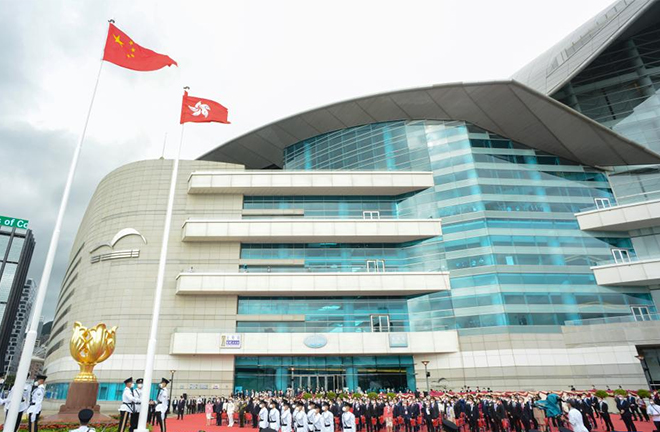Hong Kong SAR celebrates 25th anniversary

A flag-raising ceremony is held by the government of the Hong Kong Special Administrative Region to celebrate the 25th anniversary of Hong Kong’s return to the motherland, at the Golden Bauhinia Square in Hong Kong, July 1. Photo: XINHUA
The Hong Kong Special Administrative Region (SAR) celebrated its 25th anniversary on July 1.
Over the past 25 years since Hong Kong returned to the motherland, development of the SAR has come along in leaps and bounds under “one country, two systems.”
Greater Bay Area
The construction of the Guangdong-Hong Kong-Macao Greater Bay Area is of great significance for promoting and enriching the creative practice of “one country, two systems” in the Hong Kong SAR. According to Li Xiaobing, executive director of the Taiwan-Hong Kong-Macao Law Research Center at Nankai University, this is conducive to deepening exchanges and cooperation between the Chinese mainland and the Hong Kong SAR. It also provides new strategic support and a strong driving force for maintaining prosperity, stability, and sustainable development in Hong Kong and Macao.
Actively participating in the construction of the Greater Bay Area will help enhance Hong Kong’s international competitiveness. Mao Yanhua, director of the Institute of Guangdong, Hong Kong, and Macao Development Studies at Sun Yat-sen University, suggested that Hong Kong should actively participate in the construction of international technology innovation centers in the Greater Bay Area, by leveraging its advantages in international talent, global information, capital, and other technological innovation resources. It is advisable for the SAR to collaborate with cities in Guangdong Province in the Greater Bay Area and leverage these cities’ advantages in technical personnel, technology innovation platforms, industrial parks, and market scale. As such, they can jointly organize and implement major scientific and technological innovation projects and carry out research on key and core technology.
Talent exchange
Hong Kong can further integrate into development of the Greater Bay Area in terms of talent. Zhong Yun, deputy dean of the School of Economics at Jinan University, said that higher education institutions in Hong Kong have the advantage of being closely connected with international high-end research talent and high-level laboratories. Hong Kong should leverage this advantage and attract global scientific research talent to the Greater Bay Area. In addition, she also specifically proposed further integration of Hong Kong talent, especially young people, into the construction of the Greater Bay Area, encouraging them to study, work, start businesses, and live in the Greater Bay Area.
“The Greater Bay Area has provided new development space for youth in Hong Kong and Macao. Several youth entrepreneurship platforms in the Greater Bay Area have achieved remarkable construction results. The construction plans for the three platforms in Hengqin in Zhuhai, Qianhai in Shenzhen, and Nansha in Guangzhou, all involve support for the development of Hong Kong youth,” Zhong said.
Construction of the Guangzhou campus of the Hong Kong University of Science and Technology in Nansha District of Guangzhou is under way. The project’s first phase is scheduled to be officially put into use in September of 2022. According to the plan, the first phase of the school’s operation is from 2022 to 2027, during which 4,000 postgraduates will be trained. The number of students in the future will be about 10,000. This is just a microcosm of Hong Kong’s active integration into the construction of the Greater Bay Area.
Expanding roles
More than three years since the outlined development plan for the Guangdong-Hong Kong-Macao Greater Bay Area was unveiled, Hong Kong’s role in the construction of the Greater Bay Area has undergone a major transformation and expansion. The former international economic, financial, shipping, and trade center is now also a global offshore RMB business hub, international aviation hub, international asset management center and risk management center, an Asia-Pacific international legal and dispute resolution service center, international innovation and technology center, regional intellectual property trade center, and international cultural and artistic exchange center, among its many roles.
Li Shenglan, deputy director of the Institute of Free Trade Zones at Sun Yat-sen University, said that Hong Kong will play an increasingly important role in building the new development paradigm of “dual circulation” in the Greater Bay Area. Under the “one country, two systems” principle, Hong Kong occupies a very special position in China’s new development paradigm of “dual circulation,” being a vital area where the domestic market and the international market meet. Hong Kong has become a participant in domestic circulation, and a promoter of domestic and international “dual circulation,” which is a very important development opportunity for both the Chinese mainland and Hong Kong.
Edited by JIANG HONG
